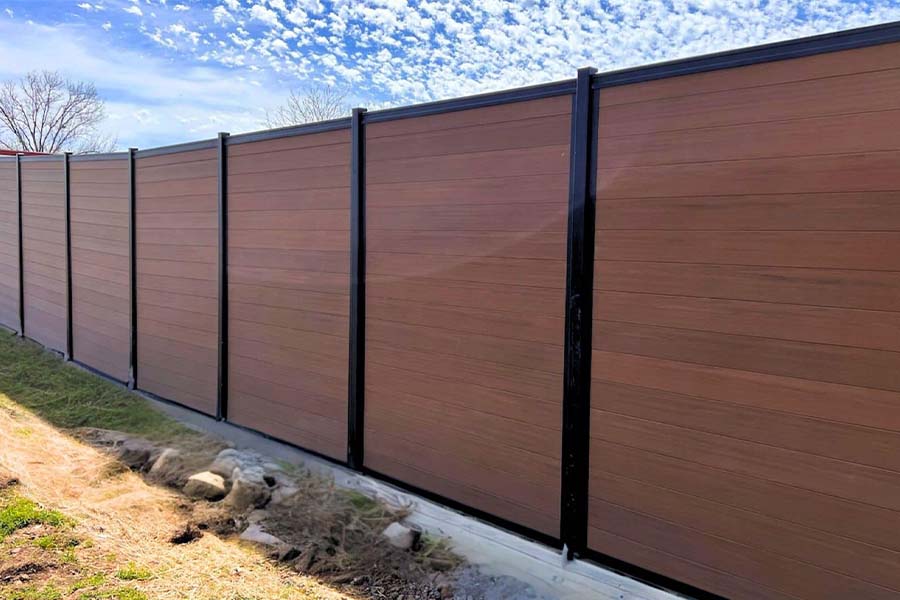All Categories
Featured

Picking the ideal fence material is essential for accomplishing the equilibrium of longevity, looks, and functionality that matches your property. Timber, vinyl, and aluminum are preferred selections, each with unique attributes that deal with specific demands. Right here's an in-depth consider the advantages and negative aspects of these 3 materials.
Wood Fencing. Pros:. Classic Allure: Wood uses a natural, timeless appearance that complements numerous building designs. Personalized: It can be repainted or stained in a selection of colors and styles. Affordable: Wood fencings are often more affordable upfront than vinyl or aluminum. Eco-Friendly: As a renewable energy, wood is sustainable and biodegradable when sourced responsibly. Cons:. Maintenance-Intensive: Requires regular discoloration, paint, or sealing to shield versus weather condition and insects. Shorter Life-span: Depending upon the type of wood and environment, it generally lasts 10-15 years. Vulnerability to Damages: Prone to decaying, warping, and termite damages without proper care. Timber is optimal for homeowners that value aesthetics and want to invest effort and time in maintenance to extend its life.
Vinyl Fence. Pros:. Sturdy: Immune to parasites, rot, and weather condition, plastic preserves its framework in harsh conditions. Low Maintenance: Calls for little maintenance beyond periodic cleaning. Lengthy Life expectancy: Plastic can last 20-30 years without substantial wear or damages. Versatile Designs: Readily available in numerous shades, textures, and styles, including alternatives that resemble wood. Cons:. Costly Setup: Vinyl fences are much more expensive to set up contrasted to timber. Breakable in Cold Weather: Plastic can fracture in extreme chilly climates. Difficult to Repair work: If damaged, whole areas might require replacement, which can be testing to match. Vinyl fencing is a fantastic option for those focusing on long life and marginal maintenance, even if it features a higher ahead of time cost.

Aluminum Fence. Pros:. Rust-Resistant: Aluminum does not rust, making it suitable for damp or moist areas. Solid yet light-weight: Offers stamina without being excessively heavy, which simplifies installment. Low Maintenance: Needs little greater than cleaning and occasional repainting. Longevity: Light weight aluminum fencings can last for decades without considerable degeneration. Stylish Layouts: Typically made use of for decorative purposes, light weight aluminum includes refinement to any kind of residential property. Disadvantages:. High Initial Expense: Light weight aluminum fences are amongst the a lot more pricey choices. Minimal Privacy: Commonly created with open spaces, they do not obstruct sights or noise. Susceptible to Damages: While strong, light weight aluminum can be nicked or bent with hefty impact. Aluminum is ideal suited for those who desire a lasting, trendy fencing and don't call for full privacy.
Making the Right Option. Each material has its weaknesses and staminas:

Wood is ideal for eco-conscious customers and standard visual appeals that do not mind upkeep. Plastic helps home owners looking for a weather-resistant, low-maintenance remedy. Aluminum is a sturdy, decorative choice for those who desire elegance and long life. Consider your top priorities-- whether it's cost, privacy, maintenance, or appearance-- and speak with a fencing specialist to pick the product that ideal satisfies your requirements. A well-selected fence will boost your residential or commercial property for many years to find.
Latest Posts
Find Out Reduce Expenses on Car Maintenance with Montclare Auto Repair’s Special Deals
Published May 26, 25
1 min read
Discover Cut Costs on Car Maintenance with Montclare Auto Repair’s Limited-Time Deals
Published May 25, 25
1 min read
Discover Special Auto Repair Specials in Chicago at Montclare Auto Repair
Published May 22, 25
1 min read
More
Latest Posts
Find Out Reduce Expenses on Car Maintenance with Montclare Auto Repair’s Special Deals
Published May 26, 25
1 min read
Discover Cut Costs on Car Maintenance with Montclare Auto Repair’s Limited-Time Deals
Published May 25, 25
1 min read
Discover Special Auto Repair Specials in Chicago at Montclare Auto Repair
Published May 22, 25
1 min read